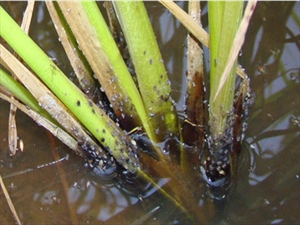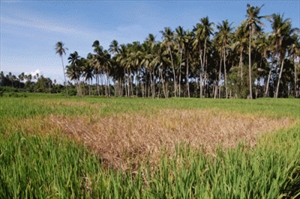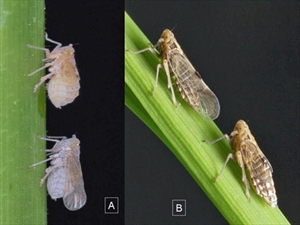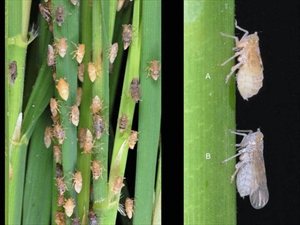- Widespread distribution. South and Southeast Asia, Oceania. Rice and wild grasses. An important pest.
- Planthoppers suck sap, reducing the number of tillers, panicles, and filled grains. Plants are stunted. Severe infestations, especially from tillering to flowering, cause 'hopperburn'; plants dry out and collapse.
- Infestations start when winged forms arrive, and lay eggs which produce nymphs and wingless adults.
- Cultural control: tolerant varieties; avoid over-lapping crops; crop rotation; remove 'volunteer' plants; split applications of nitrogen fertilizer; avoid ratoon crops; plough in stubble immediately after harvest.
- Chemical control: only use if populations high (1-2 insects per tiller). Check current recommendations as often planthoppers become resistant to insecticides.
Pacific Pests, Pathogens and Weeds - Online edition
Pacific Pests, Pathogens, Weeds & Pesticides
Rice brown planthopper (064)
Brown planthopper
Nilaparvata lugens
AUTHORS Helen Tsatsia & Grahame Jackson
Information from CABI (2019) Nilaparvata lugens (brown planthopper) Crop Protection Compendium. (https://www.cabi.org/cpc/datasheet/36301); and (including Photos 1,3&4) from Planthopper. Rice Knowledge Bank. IRRI. (http://www.knowledgebank.irri.org/training/fact-sheets/pest-management/insects/item/planthopper). Photo 2 Paul Langlois, Museum Collections: Cicadas, Planthoppers, & Allies, USDA APHIS PPQ, Bugwood.org.
Produced with support from the Australian Centre for International Agricultural Research under project PC/2010/090: Strengthening integrated crop management research in the Pacific Islands in support of sustainable intensification of high-value crop production, implemented by the University of Queensland and the Secretariat of the Pacific Community.







